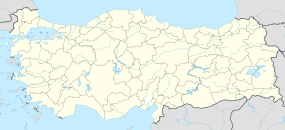Ἄσσος Behramkale | |
 Ruins of the Temple of Athena in Assos | |
| Location | Ayvacık, Çanakkale Province, Turkey |
|---|---|
| Region | Troad |
| Coordinates | 39°29′16″N 26°20′13″E / 39.48778°N 26.33694°E |
| Type | Settlement |
| History | |
| Builder | Colonists from Mithymna |
| Founded | 10th century BC |
| Associated with | Aristotle |
| Site notes | |
| Website | Assos Archaeological Site |

Assos (/ˈæsɒs/; Greek: Ἄσσος, Latin: Assus) was an ancient Greek city near today's Behramkale (pronounced [behˈɾamkale]) or Behram for short, which most people still call by its ancient name of Assos. It is located on the Aegean coast in the Ayvacık district of Çanakkale province, Turkey. It is on the southern side of Biga Peninsula (better known by its ancient name of the Troad). Assos sits on the coast of the Adramyttian Gulf (Turkish: Edremit Körfezi[1]) and used to offer the only good harbour along the 80 kilometres (50 mi) of coast which made it very important for shipping in the Troad.[1]
During Pliny the Elder's lifetime (1st century AD), the city was also known as Apollonia (Ἀπολλωνία).[2]
Assos' most famous resident was the Greek philosopher Aristotle. Assos is also the birthplace of Cleanthes, who later was to succeed Zeno of Citium as head of the Stoic school of philosophy. The Acts of the Apostles[3] also refers to visits to the city by Luke the Evangelist and Paul the Apostle.[4]
Today, Assos is a holiday retreat amid ancient ruins. In 2017 it was inscribed on the UNESCO Tentative list of World Heritage Sites in Turkey.[5]
- ^ a b Eleventh edition of the Encyclopædia Britannica, p. 790.
- ^ Pliny. Naturalis Historia. Vol. 5.32.
- ^ Acts 20:13–14
- ^ St. Paul's Routes: From Troas to Assos Archived March 24, 2012, at the Wayback Machine
- ^ "Archaeological Site of Assos". UNESCO World Heritage Centre. UNESCO. Retrieved 4 June 2018.

